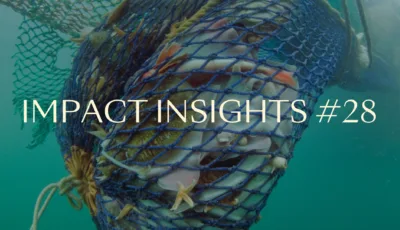High Seas, Fast Fashion Crackdown, & Regenerative Farming

Ready to catch up on the latest in sustainability? We covered the global push to ratify the High Seas Treaty at UNOC3, France’s bold move to rein in ultra-fast fashion, and the EU’s Green Claims directive surviving calls for withdrawal. Plus, a landmark report reveals how regenerative agriculture could slash agricultural emissions by 84%.
■ Call for en masse ratification of the treaty that can save our oceans
France and Costa Rica co-hosted the 3rd UN Ocean Conference in Nice, France. At the top of the agenda: getting countries to ratify the High Seas Treaty en masse. This treaty aims to protect more of our oceans, of which only 1.2% are considered protected today. Protecting international waters is exceptionally pressing. They make up 50% of the planet’s surface, yet they are the object of abuses, ranging from overfishing to deep-sea mining.
Without healthy oceans, our species can hardly move forward. Since the 1970s, oceans have absorbed 90% of the excess heat caused by GHG emissions. As a result, they have become more acidic, warmer, and less able to absorb CO2. We are now seeing dead zones where oceans no longer support life.
With the Treaty, 30% of the ocean surface could become Marine Protected Areas (MPAs) where fishing is banned, allowing life to bounce back not only in these MPAs, but also in non-protected areas due to fish migration. The treaty will only come into force if more than 60 countries ratify it. At the time of writing, 50 countries have signed the Treaty.
You can learn more about this issue by watching David Attenborough’s latest documentary, Ocean.
■ France to sanction ultra-fast-fashion
The French Senate adopted, with 337 votes for and only one against, a bill to reduce the environmental impact of the textile industry. The bill will sanction “ultra” fast-fashion companies such as Shein and Temu, ban their advertisements, and sanction influencers promoting them. They will need to inform customers about the environmental cost of their products in terms of emissions, resource usage, and recyclability. Companies with the lowest scores will be taxed up to 5 euros per product in 2025, up to 10 euros in 2030; however, the tax cannot exceed 50% of the item’s retail price.
48 clothing items per person are released into the French market each year, and 35 are thrown away every second. Fast fashion, which relies on mass production and low costs, has far-reaching consequences: it promotes overconsumption, causes significant ecological damage from production to disposal, threatens other clothing businesses, and raises questions about working conditions at manufacturing sites.
This bill could set a precedent across Europe. Unfortunately, the Senate's suggested amendments would take French and European brands out of scope, such as Zara or H&M, potentially a sign of protectionism rather than environmental concerns.
■ Dodging the bullet: the EU “Green Claims directive” lives on to fight greenwashing
In June, a European Commission spokesperson suggested it could withdraw the EU Green Claims proposal. This came after the European People's Party (EPP) requested that the Commission “reconsider and ultimately withdraw” the directive, considered too burdensome and against the current trend of simplifying compliance for companies.
The proposal aims to regulate how companies advertise the environmental benefits of their products and services in the European market. The goal is to protect consumers from greenwashing and support companies with genuine and robust sustainability strategies. In the EU, 50% of green claims by companies are considered vague or misleading, and 40% have no supporting evidence.
This created turmoil for companies that the proposal would impact. However, it now seems that the EU Commission is still willing to push forward the directive, if it leaves out micro-companies.
■ Landmark report proves regenerative agriculture could slash agriculture emissions by 84%
The European Alliance for Regenerative Agriculture (EARA) released a landmark report in June, showcasing that European farmers can produce significantly more food with fewer inputs by transitioning to regenerative agriculture - using cover crops, reduced tillage, crop rotation, etc.
Regenerating farmers produce on average just 1% lower yields than conventional farmers, using 62% less synthetic nitrogen fertilizer and 76% less pesticides per hectare.
Benefits do not stop there. For similar yields, regenerative farmers achieve +15% soil cover, photosynthesis, and plant diversity, and their fields are 0.3 degrees cooler than conventional farmers’ during summer. The outcomes: soils are more resistant to floods and heat, ecosystems host more fauna and flora, farmers experience improved economic returns, and they increase the food security of their regions. European farmers could avoid 141 tonnes of CO₂e annually, already in the first years of transition, 84% of the net GHG emissions from the EU agricultural sector.
The message is clear: we need a shift away from a high-input chemical agriculture that weakens soil and yields and raises operational costs over time. In 2025, the loss in agricultural revenue from weather events and increased costs was estimated at EUR 60 billion for Europe.
Read the report to understand how the Regenerating Full Productivity (RFP) index can easily compare farm performance across multiple factors.


